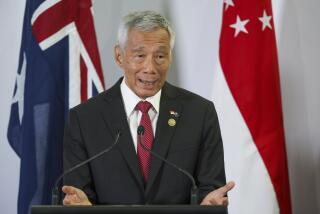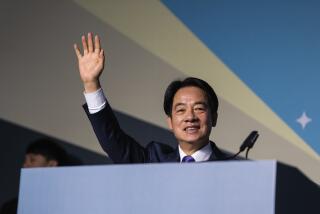Hong Kong’s leader elected to second term
- Share via
BEIJING — A small group of elites elected Hong Kong leader Donald Tsang to a second term Sunday as the incumbent promised to fight for universal suffrage for the former British colony.
Tsang won with 84% of the 772 valid votes cast by a select committee of professionals under a complex electoral system designed to ensure Beijing maintains its grip on the process. His victory was widely expected.
“I laid out a solid foundation for moving toward universal suffrage in a modest way,” said the career civil servant in his victory speech, wearing his signature bow tie. “We’ve made history.”
When pressed by reporters for a date, however, Tsang declined to provide specifics.
Tsang’s opponent, lawmaker Alan Leong, told a local radio station that the process was “rigged” because the public wasn’t allowed to participate. “Hong Kong people are ready for democracy yesterday,” he added.
Despite the lack of suspense, however, the election broke some ground. It was the first contested race since Hong Kong’s 1997 return to Chinese rule. In the past, democracy groups lacked sufficient signatures to field a candidate, or boycotted the polling.
It also featured the first televised debates, giving people a taste of something approaching a policy contest. And Tsang’s vow to craft a road map for full democracy was the first such pledge by an incumbent under Chinese rule.
Beijing, however, is wary of giving Hong Kong voters too much power. Weeks before the election, Chinese officials pointedly warned Hong Kong that the National People’s Congress, which largely rubber-stamps decisions of the Communist Party, has the final word on reforms.
Among China’s concerns is that Hong Kong might elect an anti-Beijing government or that free elections could spur calls for democracy on the mainland.
China’s Foreign Ministry, the central liaison office in Hong Kong and the People’s Liberation Army garrison congratulated Tsang and pledged their support, the state-run New China News Agency said.
Some predict that Hong Kong won’t see universal suffrage before 2017 at the earliest. Hong Kong’s leaders, or chief executives, serve five-year terms. Britain also didn’t allow universal suffrage during its century-long rule.
China doesn’t like to hear Hong Kong residents call for “sovereign rights” given their status as citizens of China, said Yin Hongbiao, an international relations professor at Beijing University. Nor is it sure how to build a democracy should it decide to move ahead.
“The mainland’s rule is still influenced by Soviet-era thinking and Mao’s idea that ‘power comes from the barrel of a gun,’ ” Yin said. “It needs time and favors a gradual transition process.”
Tsang, a 38-year veteran of the Hong Kong civil service, didn’t graduate from college. Nevertheless, the son of a policeman rose quickly through the service ranks to become the British colony’s first ethnic Chinese financial secretary.
Analysts say Tsang might have won the election even if the semiautonomous region was fully democratic. That’s in sharp contrast to his predecessor, Tung Chee-hwa, who resigned in 2005, ostensibly over health reasons, after a series of unpopular policy decisions and public relations gaffes.
“Tsang’s very high opinion poll ratings of around 70% show he has the community’s endorsement,” said Anthony Cheung, a professor and chairman of Hong Kong’s SynergyNet, a democracy think tank. “Now attention shifts to what he will do over the next five years.”
Analysts say one of Tsang’s priorities probably will be constitutional reform.
Some also hope he turns his attention to practical problems put on hold by Tung’s resignation and Tsang’s short first term as a fill-in.
These include moves to make Hong Kong’s economy more competitive, strengthen its medical and social security programs, and plan for an aging population.
Democracy groups said they also had work to do. Leong’s relatively low popularity ratings of around 20% suggest the movement could do a better job appealing to centrists.
“We also have to establish ourselves as a viable alternative government through our policy platforms and debates,” said Joseph Cheng, a professor at the City University of Hong Kong and prominent member of the democracy movement.
“Rather than just being critics, we want to show our constructive side.”
More to Read
Sign up for Essential California
The most important California stories and recommendations in your inbox every morning.
You may occasionally receive promotional content from the Los Angeles Times.













